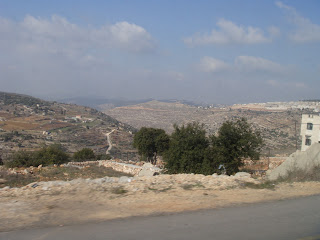"Hey, want to go to Bethlehem with us?" "SURE!"
You hear a lot of things about the West Bank. In America, there is an insecurity about this Palestinian land. In Israel, the opinions range, as do those of international students. Our schools and sometimes our families tell us that it is unsafe to go there. I have heard many people say, "The West Bank? Yeah, I'd love to go. But I'm Jewish. And I LOOK Jewish." (I always find that statement funny as I feel like internationals are identified more with their nation than with their religion, especially as the Jewish stereotypes that exist in America are not the exact ones that exist about Israeli Jews.) Other people are very nonchalant about it. I didn't know what to think, but I decided that, regardless, I was going to go.
I was invited on this trip by a friend who is interning with the UN. He absolutely loves wandering around the West Bank and he served as our tour guide throughout, explaining to us the political tensions, the best places to get fried chicken, and what we should see.
 We boarded a bus at Damascus Gate. An Arab bus. That is really what people call them. Paid our 10 shekels and began to make our way through suburbs of Jerusalem that I have never seen before. All of a sudden, we were surrounded simply by hills with little groupings of houses on top of them. Some of them were settlements, distinguishable in their defiant-neatness. Others were Arab cities, looking much more ramshackle but filled with building materials, as though no one could decide whether they were being built up or torn down.
We boarded a bus at Damascus Gate. An Arab bus. That is really what people call them. Paid our 10 shekels and began to make our way through suburbs of Jerusalem that I have never seen before. All of a sudden, we were surrounded simply by hills with little groupings of houses on top of them. Some of them were settlements, distinguishable in their defiant-neatness. Others were Arab cities, looking much more ramshackle but filled with building materials, as though no one could decide whether they were being built up or torn down. As you can see, the Security Barrier cuts through many parts of the West Bank that it is not supposed to. Very clever, if you think about it, but it really, really has hurt the lives of Palestinians. It separates many farmers from their crops, people from their schools and jobs etc. It makes commuting disastrous and frustrating. Israel is taking over more land than it is supposed to regardless of the people whom they are taking the land from. One of the many things that I spent this short trip contemplating.
The wall has been covered in art and words. This is not a phenomenon isolated in Palestine; art covers many walls in Israel. But it was obvious that the Security Barrier was a very relevant canvas for the people's protests, messages, thoughts, hopes etc.





